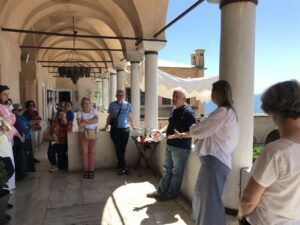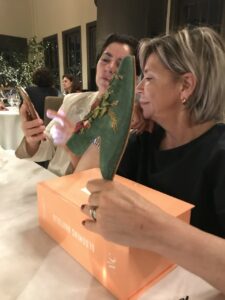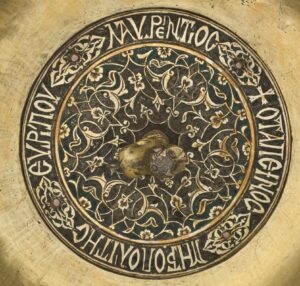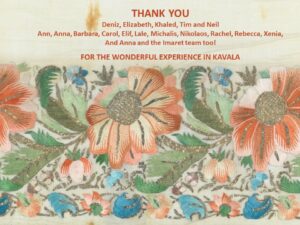East Mediterranean Embroideries
Kavala – 20-22 May 2022
Co-organised by Elizabeth Key Fowden and Deniz Türker and co-funded by the Centre of Islamic Studies, Faculty of Classics and History of Art Global Humanities fund (all of the University of Cambridge) the first associated workshop was convened at the Imaret built by Mohammed Ali in Kavala.
The Kavala workshop was devoted to the cultural hybridity of embroidery across the eastern Mediterranean region. Like woven textiles, embroidery is individual, local and regional. As objects, embroideries belong to a particular place, but travel easily. They bear in their shared and adapted motifs and materials the imprint of cultural and religious diversity, while at the same time carrying the individual stories of their place of origin, their makers and collectors. This workshop brings together historians, curators, and archaeologists to discuss how to communicate and present the dynamic transference of materials, patterns, and forms through these often-overlooked objects across the Eastern Mediterranean.
Anna Ballian inaugurated the workshop with a public lecture on ‘Art and material culture in Ottoman Greece’, setting the parameters of discussion around issues of taxonomy. Participants debated the inherent challenges of taxonomy between ancient, Byzantine, Ottoman and modern Greece, between ‘Hellenic’ and ‘Oriental’ material culture, in the Aegean and wider Mediterranean context. Workshop participants focused especially on the often entangled backgrounds of the collectors. Ann French’s presentation focused on the legacy of the ground-breaking Cambridge scholar Alan J.B. Wace, whose archives and personal textile collections have been dispersed across the Cambridge Classics Faculty, Pembroke College, the Museum of Archaeology and Anthropology, the Fitzwilliam Museum, as well as the British School at Athens and the Liverpool Art Museum.
Dedicated to the interdisciplinary study of Hellenism and the Islamic world, the Mohammed Ali Research Center (MOHA) in Kavala provided the ideal setting for our workshop, which brought together participants from University of Cambridge (History of Art, Classics and Centre of Islamic Studies), Whitworth Art Gallery (Manchester), V&A (London), Sadberk Hanım Museum (Istanbul), Calouste Gulbenkian Museum (Lisbon), Benaki Museum (Athens), Thessaloniki Aristotle University, University of the Mountains (Crete) and the Ephorate of Kavala.
Friday evening public lecture:
Anna Ballian (emerita curator, Benaki Museum of Islamic Art, Athens) – Delivered in Greek, with English translation available:
Τέχνη και υλικός πολιτισμός στην οθωμανική Ελλάδα: ανάμεσα στην ιστορία και την παράδοση (Art and material culture in Ottoman Greece: between history and tradition)
Saturday morning introduction:
Deniz Türker and Elizabeth Key Fowden (History of Art and Centre of Islamic Studies/Classics, University of Cambridge, Cambridge)
Opening presentation:
Ann French (Whitworth Gallery, Manchester) – Understanding the legacy: The embroidery collecting of RM Dawkins & AJB Wace
Saturday workshop presentations:
Carol Humphreys & Deniz Türker (History of Art and Fitzwilliam Museum, Cambridge) – Archaeology and ethnology between Hellenic and Oriental
Xenia Politou (Benaki Museum, Athens) – Greek embroideries between East and West
Lale Görünür (Sadberk Hanım Museum, Istanbul) – Curating and caring for the Sadberk Hanım Museum Textile Collection
Michalis Lychounas (Ephorate of Antiquities, Kavala) – Embroideries of the Eastern Orthodox Church from the Byzantine tradition to the Ottoman world
Rachel Dedman (Victoria and Albert Museum, London) – Curating Palestinian embroidery
Nikolaos Vryzidis (Aristotle University of Thessaloniki, Thessaloniki) – Global perspectives on later Byzantine textile culture
Jessica Hallett (Gulbenkian, Lisbon) – Embroideries in gendered narratives at the Calouste Gulbenkian Museum
Barbara Tertzis (Penelope Gandhi Mission, University of the Mountains, Crete) – ‘στησαμένη μέγαν ἱστὸν ἐνὶ μεγάροισιν ὕφαινε’ (Homer, Odyssey, B 94)
The workshop forms part of a wider study funded by a Cambridge-Stockholm Collaborative Research Grant (2020-2023) designed to bring together a core group of scholars from Cambridge and Stockholm, joined by colleagues from Greek, Turkish and other UK institutions. For more details see –Greece Between Europe and Asia.



